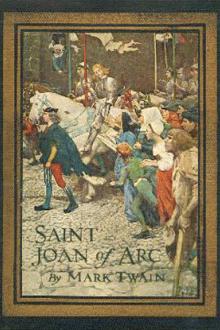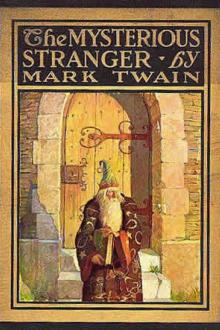Personal Recollections of Joan of Arc, vol 2, Mark Twain [books to read for beginners .TXT] 📗

- Author: Mark Twain
- Performer: -
Book online «Personal Recollections of Joan of Arc, vol 2, Mark Twain [books to read for beginners .TXT] 📗». Author Mark Twain
The Duke of Burgundy listened—but waited. He could not doubt that the French King or the French people would come forward presently and pay a higher price than the English. He kept Joan a close prisoner in a strong fortress, and continued to wait, week after week. He was a French prince, and was at heart ashamed to sell her to the English. Yet with all his waiting no offer came to him from the French side.
One day Joan played a cunning truck on her jailer, and not only slipped out of her prison, but locked him up in it. But as she fled away she was seen by a sentinel, and was caught and brought back.
Then she was sent to Beaurevoir, a stronger castle. This was early in August, and she had been in captivity more than two months now. Here she was shut up in the top of a tower which was sixty feet high. She ate her heart there for another long stretch—about three months and a half. And she was aware, all these weary five months of captivity, that the English, under cover of the Church, were dickering for her as one would dicker for a horse or a slave, and that France was silent, the King silent, all her friends the same. Yes, it was pitiful.
And yet when she heard at last that Compi�gne was being closely besieged and likely to be captured, and that the enemy had declared that no inhabitant of it should escape massacre, not even children of seven years of age, she was in a fever at once to fly to our rescue. So she tore her bedclothes to strips and tied them together and descended this frail rope in the night, and it broke, and she fell and was badly bruised, and remained three days insensible, meantime neither eating nor drinking.
And now came relief to us, led by the Count of Vend�me, and Compi�gne was saved and the siege raised. This was a disaster to the Duke of Burgundy. He had to save money now. It was a good time for a new bid to be made for Joan of Arc. The English at once sent a French bishop—that forever infamous Pierre Cauchon of Beauvais. He was partly promised the Archbishopric of Rouen, which was vacant, if he should succeed. He claimed the right to preside over Joan’s ecclesiastical trial because the battle-ground where she was taken was within his diocese. By the military usage of the time the ransom of a royal prince was 10,000 livres of gold, which is 61,125 francs—a fixed sum, you see. It must be accepted when offered; it could not be refused.
Cauchon brought the offer of this very sum from the English—a royal prince’s ransom for the poor little peasant-girl of Domremy. It shows in a striking way the English idea of her formidable importance. It was accepted. For that sum Joan of Arc, the Savior of France, was sold; sold to her enemies; to the enemies of her country; enemies who had lashed and thrashed and thumped and trounced France for a century and made holiday sport of it; enemies who had forgotten, years and years ago, what a Frenchman’s face was like, so used were they to seeing nothing but his back; enemies whom she had whipped, whom she had cowed, whom she had taught to respect French valor, new-born in her nation by the breath of her spirit; enemies who hungered for her life as being the only puissance able to stand between English triumph and French degradation. Sold to a French priest by a French prince, with the French King and the French nation standing thankless by and saying nothing.
And she—what did she say? Nothing. Not a reproach passed her lips. She was too great for that—she was Joan of Arc; and when that is said, all is said.
As a soldier, her record was spotless. She could not be called to account for anything under that head. A subterfuge must be found, and, as we have seen, was found. She must be tried by priests for crimes against religion. If none could be discovered, some must be invented. Let the miscreant Cauchon alone to contrive those.
Rouen was chosen as the scene of the trial. It was in the heart of the English power; its population had been under English dominion so many generations that they were hardly French now, save in language. The place was strongly garrisoned. Joan was taken there near the end of December, 1430, and flung into a dungeon. Yes, and clothed in chains, that free spirit!
Still France made no move. How do I account for this? I think there is only one way. You will remember that whenever Joan was not at the front, the French held back and ventured nothing; that whenever she led, they swept everything before them, so long as they could see her white armor or her banner; that every time she fell wounded or was reported killed—as at Compi�gne—they broke in panic and fled like sheep. I argue from this that they had undergone no real transformation as yet; that at bottom they were still under the spell of a timorousness born of generations of unsuccess, and a lack of confidence in each other and in their leaders born of old and bitter experience in the way of treacheries of all sorts—for their kings had been treacherous to their great vassals and to their generals, and these in turn were treacherous to the head of the state and to each other. The soldiery found that they could depend utterly on Joan, and upon her alone. With her gone, everything was gone. She was the sun that melted the frozen torrents and set them boiling; with that sun removed, they froze again, and the army and all France became what they had been before, mere dead corpses—that and nothing more; incapable of thought, hope, ambition, or motion.
Chapter 2 Joan Sold to the English
MY WOUND gave me a great deal of trouble clear into the first part of October; then the fresher weather renewed my life and strength. All this time there were reports drifting about that the King was going to ransom Joan. I believed these, for I was young and had not yet found out the littleness and meanness of our poor human race, which brags about itself so much, and thinks it is better and higher than the other animals.
In October I was well enough to go out with two sorties, and in the second one, on the 23d, I was wounded again. My luck had turned, you see. On the night of the 25th the besiegers decamped, and in the disorder and confusion one of their prisoners escaped and got safe into Compi�gne, and hobble into my room as pallid and pathetic an object as you would wish to see.
“What? Alive? No�l Rainguesson!”
It was indeed he. It was a most joyful meeting, that you will easily know; and also as sad as it was joyful. We could not speak Joan’s name. One’s voice would have broken down. We knew who was meant when she was mentioned; we could say “she” and “her,” but we could not speak the name.
We talked of the personal staff. Old D’Aulon, wounded and a prisoner, was still with Joan and serving her, by permission of the Duke of Burgundy. Joan was being treated with respect due to her rank and to her character as a prisoner of war taken in honorable conflict. And this was continued—as we learned later—until she fell into the hands of that bastard of Satan, Pierre Cauchon, Bishop of Beauvais.
No�l was full of noble and affectionate praises and appreaciations of our old boastful big Standard-Bearer, now gone silent forever, his real and imaginary battles all fought, his work done, his life honorably closed and completed.
“And think of his luck!” burst out No�l, with his eyes full of tears. “Always the pet child of luck!
See how it followed him and stayed by him, from his first step all through, in the field or out of it; always a splendid figure in the public eye, courted and envied everywhere; always having a chance to do fine things and always doing them; in the beginning called the Paladin in joke, and called it afterward in earnest because he magnificently made the title good; and at last—supremest luck of all—died in the field! died with his harness on; died faithful to his charg, the Standard in his hand; died—oh, think of it—with the approving eye of Joan of Arc upon him!
He drained the cup of glory to the last drop, and went jubilant to his peace, blessedly spared all part in the disaster which was to follow. What luck, what luck! And we? What was our sin that we are still here, we who have also earned our place with the happy dead?”
And presently he said:
“They tore the sacred Standard from his dead hand and carried it away, their most precious prize after its captured owner. But they haven’t it now. A month ago we put our lives upon the risk—our two good knights, my fellow-prisoners, and I—and stole it, and got it smuggled by trusty hands to Orleans, and there it is now, safe for all time in the Treasury.”
I was glad and grateful to learn that. I have seen it often since, when I have gone to Orleans on the 8th of May to be the petted old guest of the city and hold the first place of honor at the banquets and in the processions—I mean since Joan’s brothers passed from this life. It will still be there, sacredly guarded by French love, a thousand years from now—yes, as long as any shred of it hangs together. [1] Two or three weeks after this talk came tehe tremendous news like a thunder-clap, and we were aghast—Joan of Arc sold to the English!
Not for a moment had we ever dreamed of such a thing. We were young, you see, and did not know the human race, as I have said before. We had been so proud of our country, so sure of her nobleness, her magnanimity, her gratitude. We had expected little of the King, but of France we had expected everything. Everybody knew that in various towns patriot priests had been marching in procession urging the people to sacrifice money, property, everything, and buy the freedom of their heavensent deliverer. That the money would be raised we had not thought of doubting.
But it was all over now, all over. It was a bitter time for us. The heavens seemed hung with black; all cheer went out from our hearts. Was this comrade here at my bedside really No�l Rainguesson, that light-hearted creature whose whole life was but one long joke, and who used up more breath in laughter than in keeping his body alive? No, no; that No�l I was to see no more. This one’s heart was broken. He moved grieving about, and absently, like one in a dream; the stream of his laughter was dried at its source.
Well, that was best. It was my own mood. We were company for each other.





Comments (0)